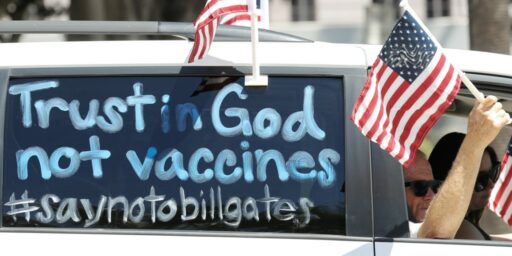Congress Considering Secretive Drug Approval Agency
Congress is considering the creation of a Biomedical Advanced Research and Development Agency to speed approval of drugs and vaccines needed to respond to terrorist attacks or pandemics. It would operate largely in secret, exempt from the Freedom of Information Act and Federal Advisory Committee Act.
GOP Wants to Create Secretive Government Agency (AP)
By creating a federal agency shielded from public scrutiny, some lawmakers think they can speed the development and testing of new drugs and vaccines needed to respond to a bioterrorist attack or super-flu pandemic. The proposed Biomedical Advanced Research and Development Agency, or BARDA, would be exempt from long-standing open records and meetings laws that apply to most government departments, according to legislation approved Oct. 18 by the Senate health committee.
Those exemptions would streamline the development process, safeguard national security and protect the proprietary interests of drug companies, say Republican backers of the bill. The legislation also proposes giving manufacturers immunity from liability in exchange for their participation in the public-private effort. “We must ensure the federal government acts as a partner with the private sector, providing the incentives and protections necessary to bring more and better drugs and vaccines to market faster,” Sen. Richard Burr, R-N.C., said when the Committee on Health, Education, Labor and Pensions approved the bill. The agency would provide the funding for development of treatments and vaccines to protect the United States from natural pandemics as well as chemical, biological and radiological agents.
But it is the secrecy and immunity provisions of the legislation that have alarmed patient rights and open government advocates. The agency would be exempt from the Freedom of Information and Federal Advisory Committee acts, both considered crucial for monitoring government accountability. “There is no other agency that I am aware of where the agency is totally exempt either from FOIA or FACA,” said Pete Weitzel, coordinator of the Coalition of Journalists for Open Government. The coalition is an alliance of journalism groups, including the American Society of Newspaper Editors and Associated Press Managing Editors, that wrote to lawmakers seeking amendments to the bill. “That is a cause for major concern and should raise major policy concerns,” Weitzel said.
Burr spokesman Doug Heye said the provisions would keep competitors from gaining proprietary information through FOIA. However, confidential business information already is exempt from FOIA. “There’s no secrecy involved in BARDA,” Heye said. “That is absolutely false. This is an agency that will be putting out information daily.”
[…]
Republican and Democratic lawmakers alike agree the drug industry needs some protections to encourage it to produce emergency stocks of vaccines and drugs, but Democrats have balked at providing blanket immunity without first establishing a compensation fund for patients. Republicans are pushing for liability protections for vaccine manufacturers on other fronts as well. Senate Majority Leader Bill Frist, R-Tenn., is seeking to add such protections to a defense appropriations bill.
The aim of the bill–removing red tape for drugs that need to be fast tracked–makes perfect sense. Limiting the liability of pharamaceutical companies in these instances would also seem necessary if drugs are going to be used before normal testing regimes can play out. So long as no bad faith is demonstrated on part of the manufacturer, liability would reasonably shift to the taxpayers for drugs distributed under these emergency measures.
The secrecy requirements, however, are not apparent. Surely, the existing procedures used by the FDA protect the proprietary information of pharmaceutical companies well enough.






Well, it helps if some of the studies need to disappear, due to disappointing results. Given the Bush administration, the best that we could hope for is that useless drugs were approved and purchased; the most likely is that dangerous and useless drugs are approved and purchased.
The main reason, though, IMHO is that this criminalizes whistle-blowers, which is something that the Bush administration loves.
I would think the secrecy is so that we don’t hand potential terrorists/enemy states a list of biological agents that won’t work.
Eric: You make an interesting point.